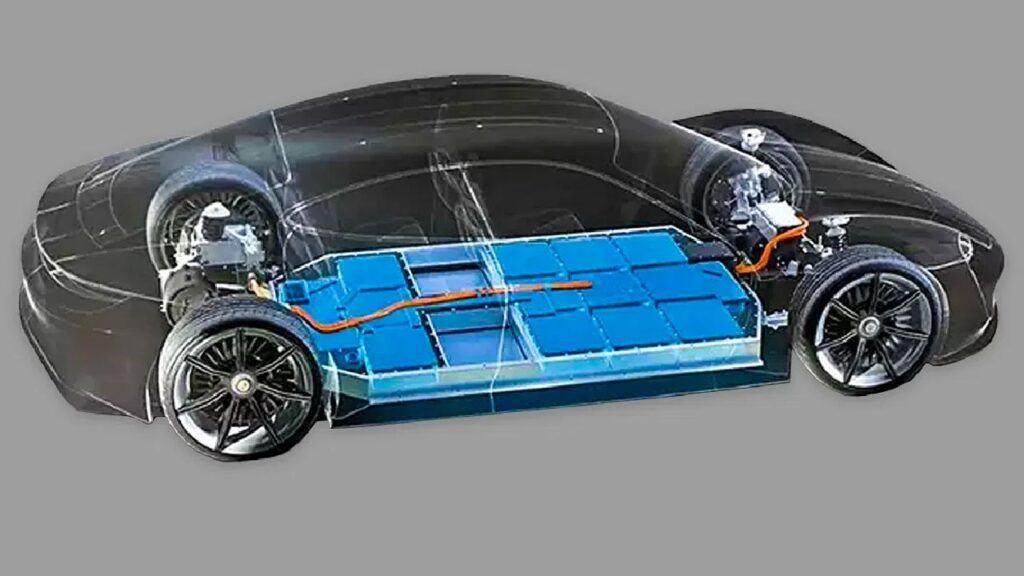- Solid-state battery technology seems to address the shortcomings of regular Lithium-ion batteries.
- In contrast to regular Li-ion batteries, solid-state batteries don’t use liquid or gel electrolytes in their construction.
- This eliminates the fire hazards inherently associated with regular Li-ion batteries causing explosions.
There are over 40 solid-state battery companies for EVs across the world at the moment. Some of these are owned or operated by the legacy carmakers themselves to stay ahead in the competition of the EV wave. These batteries have a cathode (+) and a solid-state ceramic separator in contact with the anode (-) which is formed after ion transfer. As the battery charges, the Lithium ions travel through the ceramic separator and deposit on the contact surface on the other side making an anode of pure metallic Lithium.
You might also like: Does the Future of EVs Rest on Sodium Ion Batteries?

This Lithium metal anode allows the energy to be stored in the battery in a smaller area increasing the energy density. Hence, the overall weight of this configuration is lower than the regular Lithium-ion batteries, the energy density is higher leading to an increased range, charging times are shorter and the system is non-inflammable. This construction, essentially, addresses all the shortcomings typical of Li-ion batteries. However, mass production has not commenced yet. Here are the top 5 companies that are developing this technology.
You might also like: Are Chargers at DC Fast Charging Stations Bad For EVs?
Top Solid-State Battery Companies For EVs
Volkswagen & Bill Gates – QuantumScape
QuantumScape is an American company that makes solid-state batteries for EVs and is based in San Jose, California. It was established in 2010 and employs around 400 people. However, the most important aspect of this company is the fact that it is backed by Volkswagen and Bill Gates. Its main features include a 650 km range, 380-500 Wh/kg energy density (regular Li-ion batteries have somewhere around 250 Wh/kg) and a charge time of around 15 mins.
BMW & Ford – Solid Power
Solid Power is a solid-state battery manufacturer that is partners with BMW and Ford. It specializes in sulfide-based solid ion-conducting chemistry (replacing liquid electrolytes in regular Li-ion batteries) and also swapping the graphite anode with a Lithium metal anode. It is producing 2 Ah cells with 320 Wh/kg energy density.
You might also like: Tesla Battery (4680) vs BYD Blade Battery – Comparison
Toyota and Panasonic – Prime Planet Energy & Solutions Inc.
The Japanese auto-giant in amidst developing its own solid-state batteries to power future EVs. It partnered with Panasonic to form Prime Planet Energy & Solutions Inc. It is planning to produce solid-state batteries in limited numbers by 2025. The batteries will have a range of 700 km and will have a charging time from 0-100% of 10-15 mins.
Hyundai – Factorial Energy
With extensive research and investment in solid-state batteries over the past 6 years, Factorial Energy is a Hyundai-backed company. At the 2023 Consumers Electronics Show (CES) in Las Vegas, Factorial showcased its 100 Ah prototype cells. These will offer 30% higher energy density than the traditional Li-ion batteries.
With such giants of the automotive industry backing this technology, it sure looks like a matter of time before mass production of these solid-state batteries for EVs starts offering greater and safer alternatives to the existing Li-ion batteries. Apart from that, alternative battery technologies like Sodium-ion will also witness some more R&D. Within a brief span of a few years, consumers might have a wide choice while considering electric cars in terms of price, range and safety.
